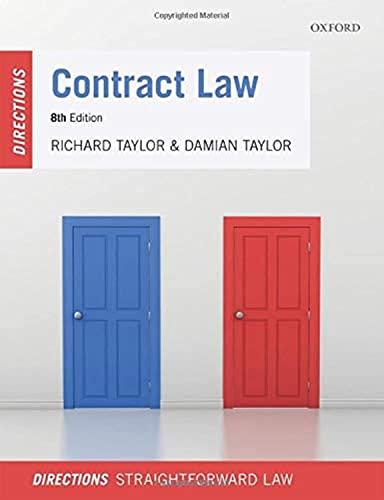Question
1. Dynasty Kitchen Cabinets v. Soheili , 2011 BCPC 414 (CanLII) The corporate defendant consented to a judgment against it. The issue was whether its
1.Dynasty Kitchen Cabinets v. Soheili, 2011 BCPC 414 (CanLII)
The corporate defendant consented to a judgment against it. The issue was whether its owner/director, Soheili, was personally liable. Dynasty provided cabinets for Soheili's personal residence. The transaction was with the corporate defendant. The house went into foreclosure, but Dynasty was owed $250000. Soheili did not give a personal guarantee; he owed $250000 to the corporate defendant for the cabinets.
Is this a case in which the Court would "lift the corporate veil"? Why or why not?
2.BCE Inc. v. 1976 Debentureholders, [2008] 3 S.C.R. 560, 2008 SCC 69
Bell Canada debenture holders opposed a buyout of BCE, a large Canadian telecommunications corporation, by a group headed by the Ontario Teachers' Pension Plan board. The buyout was financed in part by the assumption, by Bell Canada, a wholly owned subsidiary of BCE, of $30 billion of debt. This would reduce the value of the Bell Canada debentures by about 20 percent. The value of the BCE shares would, on the other hand, increase by about 40 percent as a result of the buyout. The debenture holders therefore opposed court approval of the buyout and claimed that they were entitled to relief under the oppression remedy. The Quebec Supreme Court approved the buyout, but the Court of Appeal allowed the debenture holders' appeal and disallowed the buyout. The case went to the Supreme Court of Canada.
To whom do corporate directors owe a fiduciary duty? What should the directors do if the interests of the corporation and of particular stakeholders do not coincide? What remedies do these stakeholders have if they believe that they have not been treated fairly? Does the law require that business decisions be perfect or they will be overturned by the courts if subsequent events showed that the decisions were not correct?
3.Kaur v. Canada, 2013 TCC 227 (CanLII)
Kaur was assessed liability as the sole director of a corporation for its unremitted GST. Kaur left the operational and financial matters of the corporation to the general manager, who did not remit the GST. Kaur claimed that she did not have the expertise, knowledge, or experience to manage the administrative matters of the corporation.
Explain whether Kaur would be able to avoid liability for the unpaid GST because she had shown due diligence in respect of payment of the tax.
Step by Step Solution
There are 3 Steps involved in it
Step: 1

Get Instant Access to Expert-Tailored Solutions
See step-by-step solutions with expert insights and AI powered tools for academic success
Step: 2

Step: 3

Ace Your Homework with AI
Get the answers you need in no time with our AI-driven, step-by-step assistance
Get Started


